Cardinal Joseph Zen, Bishop Emeritus of Hong Kong, blasted Pope Francis’ Synod on Synodality, saying that the meeting’s purpose is to remove the hierarchical system centered on the bishops, the successors of the apostles, and replace it with a “democratic system” led by lay people.
In his essay, published on Thursday, Zen drew a link between the break with tradition, particularly that of relying on bishops to chart the course of the church as opposed to lay people, and Pope Francis’ highly controversial 2023 declaration in which he approved “blessings” for same-sex couples.
The Hong Kong-based Cardinal reminded readers that “there is a church document that explains the Synod (meeting), an important historical fact of the Church, that the Synod is a structure in history through which the hierarchy leads the Church.”
In contrast, Pope Francis’s Synod is no “Synod of Bishops.” Instead, lay and clerical voters make up significant portions of the ten study groups and even have voting power. The Vatican has justified the inclusion of lay people by claiming their presence is merited by the “common dignity of baptism.”
While Cardinal Zen embraced the role of all baptized Catholics in evangelization, he stressed that the church hierarchy is responsible for safeguarding the faith and charting the church’s path.
Zen wrote, “The hierarchy can ensure the direction of the Church’s journey and safeguard the content of the faith handed down from the apostles. Jesus entrusted the Church to the ‘apostolic college headed by Peter,’ and the successors of the apostles are the bishops.”
The intention of constructing the Synod this way leads Zen to conclude, “Obviously, the purpose of this conference was to overthrow the hierarchical class of the Church and implement a democratic system.”
Zen added, “The Pope had the right to convene any advisory meeting, but the Synod of Bishops pioneered by Pope Paul VI was specifically designed to enable the Pope to hear the opinions of his brother bishops. With ‘non-bishops voting together, it was no longer a Synod of Bishops.”
In addition to advocating for a return to the traditional Synod of Bishops, Zen also levied strong criticism at high-ranking Vatican officials – such as Cardinal Victor Manuel Fernández and others – who, he claims, structured the Synod in such a way as to alter church teachings to provide “ethical justifications” for matters of sex and homosexual relationships.
“From the beginning of this synod, the two cardinals leading the assembly and the Pope’s appointed head of the doctrinal office did not emphasize preserving the faith, but emphasized making changes to, in particular, the operational structure of the Church and its ethical teachings; and the ethical justification of ‘sex,’ especially regarding homosexual relationships.”
Zen also resisted a proposal discussed at the Synod to grant “local bishops’ conferences increased autonomy, including whether to decide doctrine on a local level.”
The Cardinal wrote that such a grant of “independence” would lead to a situation in which individual bishops would decide matters of faith for themselves, and the church itself would “no longer be Catholic.”
Still, despite the serious nature of the matters addressed in his essay, Zen stressed the futility of anxiety.
“It is useless for us to be anxious about these problems,” Zen wrote. “Fasting, praying (especially the rosary)! We must never despair.”

COMMENTS
Please let us know if you're having issues with commenting.